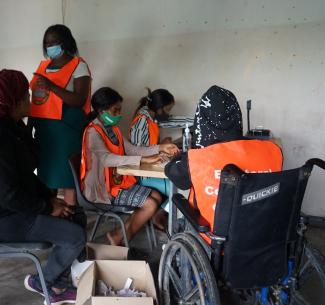The political system in Zambia has real potential to hold those who wield power to account and to promote citizen responsive governance. USAID’s Political Participation and Leadership project works with national democratic champions to promote an inclusive, productive political system that can advance and sustain the long-term prosperity and stability of Zambia.
Engaging Civil Society
The ZPPL project provides support to the Zambian electoral process through a coordinated, informed and targeted reform agenda. This is done through the provision of technical and financial support to civil society to identify and prioritize areas for electoral framework and policy reform, and to develop and implement an accompanying advocacy strategy.
Implemented by the National Democratic Institute (NDI) and the International Foundation for Electoral Systems (IFES), ZPPL provides a mechanism for citizens to dialogue with policy makers and civil-society organizations and provide informed feedback. ZPPL improves citizen-led oversight and accountability in elections through the observation of by-elections, voter registration and other preparatory activities in the lead up to the August 2021 national elections.
The COVID-19 global pandemic has had implications on democratic practices in many parts of the world including. To respond to this, ZPPL provides support to civil society organisations (CSOs) to monitor infringements on political and civil rights and monitor the use of funds donated to COVID-19 programs.
|
Promote Dialogue on Inclusive Representation
Representation from diverse populations in the political process is an important part of the political process. ZPPL supports the inclusion of women and youth, and enhances the knowledge of civil society organisations and citizens about the different types of Mixed Member Electoral Systems (MMES). This is a system in which voters choose a member of parliament and also choose from another list a representative from a special category, i.e. women, youth or persons living with disability (the groups of interest in Zambia), thereby increasing the representation of such groups of people in decision making. ZPPL also supports CSOs to advocate on MMES to communities.
Improving Electoral Officers' Capacity
Since the 2016 elections, Zambia’s electoral environment has become fragile. Several incidents of electoral-related violence attest to this trend. Political party officials and their members are often the source of violence and related misunderstandings. District electoral officials are at the center of the electoral process through their roles in overseeing voter registration, filing of nomination papers, voting day, and vote counting. They are in regular interaction with political actors and require skills to mitigate conflict and the disruption of electoral activities. ZPPL builds the capacity of electoral officials to work in these complex environments through building communication, negotiation, conflict management/prevention skills, and protocols.
Expected Results
ZPPL is expected to build a national network of domestic citizen electoral observers deployed to oversee the electoral process. Civil society organizations will be more effective at advocating for electoral and political reforms and respond to unanticipated threats or opportunities to Zambia’s democratic process by the end of the project. ZPPL will also develop election officials’ conflict management and crisis response skills.

